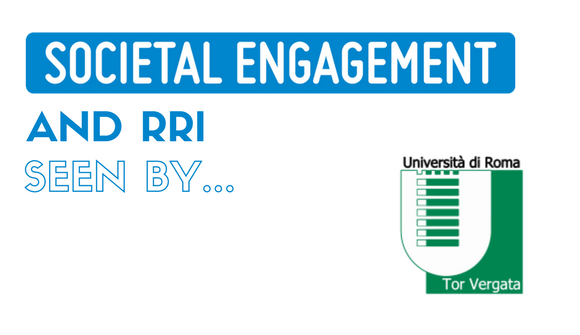University of Tor Vergata – Department of Biology
Dr. Carla Montesano – Coordination and teaching for immunology trainincoordination and teaching for immunology training in infectious diseases and innovative technologies applied to the diagnosis and monitoring of infections.
Dr. Daniele Mezzana – Key areas of interest: African societies, Relationships between science and society, evaluation of development projects, corporate social responsibility, civil society organizations, rule of law, communication issues, rural development.
1. How do you understand “Public engagement” in biosciences research?
Within the framework of “Responsible Research & Innovation” (RRI), public engagement is a crucial key. Such a key is about promoting the engagement of all societal actors in the research and innovation process. This aspect is very important in biosciences: from the economic point of view, this sector is highly research-based (above all after the “molecular revolution” occurred several decades ago), and is characterized by the cooperation between academia, public and private research centers, industry, etc… But the economic, and also political, social, and ethical issues, Biosciences cope with the involvement of many kind of actors besides researchers and industry, such as policy makers, civil society organizations, schools, medias, and others.
2. What are the current standards and actions to achieve better “Public engagement” in your country and in your University?
We may recall that the Italian Agency for the Evaluation of Universities and Research Institutions defined as “Public Engagement” in a more specific sense, is not for profit activities carried out by universities having an educational and cultural aim for social development value. Example are the activities for health information and prevention, cooperation in urban development initiatives, scientific dissemination, participation to policy-making, etc.
The evaluation criteria are: clarity of objectives, financial resources, ascertainable impact, presence and quality of evaluation “ex post” of activities. The Evaluation exercise lead to a request for a broader definition of Public Engagement, culled from that of Higher Education Funding Council for England, that is “The involvement of specialists listening to, developing their understanding of, and interacting with, non-specialists”, which seems different from the RRI concepts. As for the University of Tor Vergata as a whole, this topic is linked to the so-called “third mission” of Academy (besides education and research). The Third Mission in our University is aimed at developing all the activities able to activate direct interaction processes with civil society and entrepreneurship, with the purpose of promoting the growth of a territory, so that knowledge becomes instrumental for the “Obtaining productive outputs and social innovation”.
3. What are you aiming for with the implementation of the STARBIOS2 actions towards better “Public engagement” standards for your institute?
The aim we have about public engagement is to improve the capacity of the Department of Biology to develop an interdisciplinary research approach open to societal needs. With the development of two strategies: a better social contextualisation of the research process (with reference to e.g. drug development or food safety) and a more effective transfer of knowledge to different stakeholders, including industrial partners and civil society organizations.
4. What kind of actions are you going to establish to fulfill your objectives?
The actions we started mostly concern the Department of Biology, but several other Departments are involving the University as a whole or part of it. As for the public engagement, we have launched three kind of actions.
The first one is related to the UNESCO Chair in interdisciplinary biotechnology and bioethics created in our department since 1998. The Chair is active in technology transfer and cooperation with many European and African countries, above all, in the field of health, and in this sense it is a real public engagement tool. We are trying to evaluate this activity (through interviews, meetings and workshops), and to draft a new plan of action of the Chair.
The second kind of action is the setting up of an integrated system for exchange with society in our Department, based on a critical assessment of the different activities already carried out in this field (e.g. lectures in the schools, collaboration with industries, etc.).
The third kind of action is experimenting a new methodology of interaction between researchers and business, e.g. at trade fairs or training seminars.
5. Who is involved, from your University, in the AP in order to complete your final objective?
From the very beginning of the project, several figures of the Department of Biology take part in the activities, at different levels. Several meetings with decision makers and managers of University, such as the General Manager, the Director of Department of Biology, the President of Warranty Committee, Trade Unions, student associations, and also professors, researchers and students contributes to enlarge and improve the point of view on Public Engagement objectives and activities. A constant interplay and negotiation with members of the Department of Biology, mainly with the Director, was profitably carried out with activities open to the scientific community and civil society.
The components of the mentioned Interdisciplinary UNESCO Chair in Biotechnology and Bioethics are involved in several activities, among others, an event in the context of Italian Sustainable Development Feast was recently organized (7 June 2017). It was based on the discussion of 3 out of 17 goals in the 2030 UN Agenda: Goal 3 (Ensure healthy lives and promote well-being for all at all ages), Goal 4 (Ensure inclusive and equitable quality education and promote lifelong learning opportunities for all), Goal 10 (Reduce inequality within and among countries).









